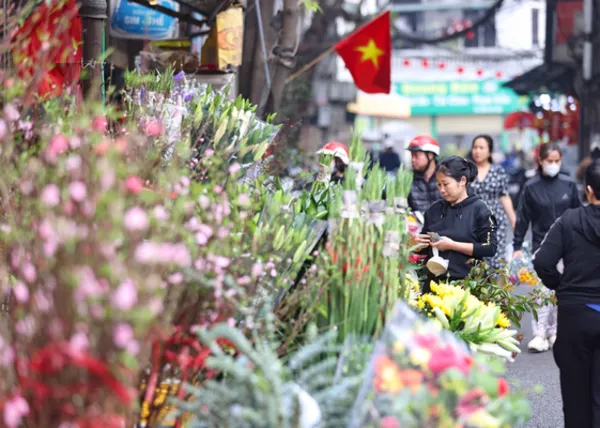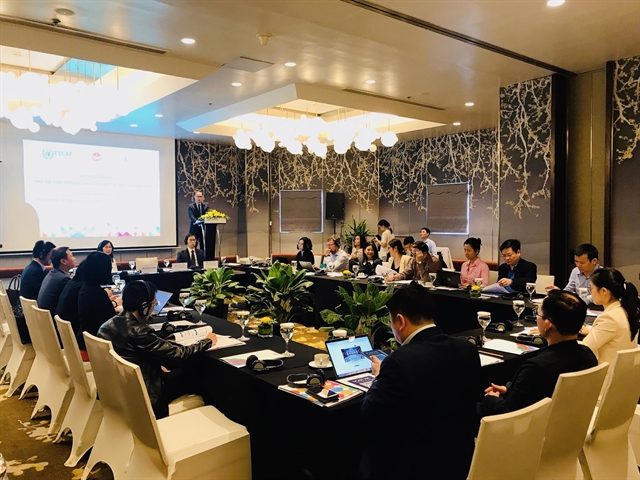 Society
Society


|
| Representatives attend the workshop. — VNS Photo Thu Trang |
HÀ NỘI — Experts discussed pathways towards a greener economy, reducing poverty, inequality and social security, and ways towards growth in digital transformation during a workshop held on Thursday in Hà Nội.
The consultation workshop “Accelerate Sustainable Development in Việt Nam: Policy Options” was co-organised by the Ministry of Planning and Investment (MPI), the United Nations (UN) in Việt Nam, and the UN Economic and Social Commission for Asia and the Pacific.
The workshop aims to assess the impact of policies and investments on economic, social and environmental indicators, including the sustainability of public debt.
Speaking at the workshop, Lê Việt Anh, Director of the Department of Science, Education, Natural Resources and Environment (DSENRE) under the MPI, said that this year marked the halfway point of implementing the Sustainable Development Goals (SDGs). However, the latest UN report showed that on a global level, through reviewing the progress of implementing 140 specific goals, only about 12 per cent are on schedule, and about 30 per cent are behind schedule.
As many as 575 million people continue to live in extreme poverty, and only about one-third of countries will meet their goal of halving poverty by 2030.
More seriously, the world is returning to hunger levels not seen since 2005, and food prices in many countries are higher than in 2015-19.
Due to investment shortfalls in education, by 2030, about 84 million children will not be able to go to school, and 300 million children or adolescents will go to school but will not be able to read and write.
The global economic context continues to have complex fluctuations, making forecasting difficult.
Strategic competition between big countries is rising, increasing poverty and inequality; global foreign investment flows in 2024-25 are forecast to have more uncertainty; food and energy security, natural disasters, epidemics, environmental pollution and climate change continue to develop unpredictably.
“This situation will certainly pose unprecedented challenges for countries worldwide and Việt Nam in achieving the SDGs by 2030,” said Anh.
At the UN’s SDGs Summit in September this year, Việt Nam identified several groups of critical solutions.
They included putting people at the centre of the development process; considering science, technology and innovation as the decisive lever for success in realising sustainable development goals until 2030; improving human resources quality; strengthening management and effective use of resources; protecting the environment and responding to climate change and mitigating natural disasters; promoting digital, green and circular economy development; effectively using financial resources; and improving data availability to monitor and evaluate the sustainable development goals implementation.
Vietnamese Government has launched many policies and investment commitments, such as promoting three national target programmes on sustainable poverty reduction, new rural areas and socio-economic development in ethnic minority areas; enhancing energy transition with ambitious clean energy and renewable energy; and speeding up digital transformation and application of scientific and technological achievements.
“The policy scenarios are selected based on their compatibility with the key groups of solutions Việt Nam has set out to intensify the SDGs performance in the remaining half of the journey,” he said.
Pauline Tamesis, UN Resident Coordinator, said, “Việt Nam has made great strides in improving living standards and lifting millions of people out of poverty. Building on these remarkable achievements, the leaders of Việt Nam have set a vision to become a high-income country by 2045 and realise net-zero emissions by 2050. This vision drives Việt Nam’s commitment to achieve the 2030 Agenda for Sustainable Development and the SDGs.”
Việt Nam’s second Voluntary National Review, presented by Nguyễn Chí Dũng, MPI Minister at the High-Level Political Forum in July, already outlined policy priorities and recommendations for SDG acceleration.
These priorities are well aligned with the six SDG transitions agreed on by member states at the SDG Summit – envisioned to generate significant multiplier effects across SDGs to promote economic prosperity while protecting human and environmental well-being.
“In sum, the modelling results show that investing in people and the environment yields significantly positive economic and social benefits in the long run, while the pressures on the government’s fiscal space subside over time because the economic benefits outweigh the costs”, she said.
It also highlights the importance of mobilising various sources of finance, including private capital, to invest in key development priorities.
“We hope that this macro-modelling exercise provides relevant evidence for crafting policy pathways suitable for Việt Nam to accelerate SDG transformations and to ensure that they are just and equitable,” she said. —VNS